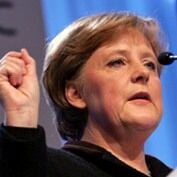
2006: Germany’s Year
Suddenly, Germany has become a nation in transition.
For the past 60 years, the Germans have been forced to hang their heads and be seen to be paying penance for their Nazi past. In addition, with their nation split east from west by the Berlin Wall for over four decades, Germany was largely restrained from playing its traditional role as the dominant power in Europe, a role it had held for most of its history since Charlemagne’s crowning as Holy Roman Emperor in a.d. 800.
Now, 16 years on from the fall of the Berlin Wall, Germany finds itself, thanks to a combination of recent circumstances, thrust into prominence once again as the geopolitical driving force in Europe.
Moving from pariah status after World War ii to its position today has been an involved process for Germany—accomplished quietly through treaties and under the umbrella of European institutions. France has been a willing partner, believing, after having suffered invasion by Germany on three occasions since 1871, that political and economic partnership with Germany was the best means of maintaining the balance of power in Western Europe. But things began to change when the Berlin Wall fell on Nov. 9, 1989. Very slowly, the united Germany has been moving away from its seemingly circumspect postwar demeanor.
As British political economist Rodney Atkinson has clearly pointed out, the objectives of the European Union are startlingly similar to the objectives of Hitler’s Third Reich. In its annual forecast for 2006, Stratfor observes that, until recently, “Europeanism was the only approved outlet for German nationalism” (January 16). Up to now, Germany has simply used the cloak of the EU and its partnership of convenience with France to ramrod into reality its traditional federalist dream of a European Empire from the Baltic to the Mediterranean, from Belgium to the Polish plain. The question of geography is now largely settled with the old territories of the Holy Roman Empire under a common European Union bureaucratic control. The time has come for Germany to emerge from under the EU umbrella and assert its own national foreign policy on the world scene. Enter, surprisingly, Angela Merkel.
Under another set of circumstances, Merkel could be fighting factions within her shaky coalition government and dwelling on methods of solving pressing domestic woes such as the highly regulated German economy that has restricted the nation’s effective growth over the past five years. However, things have played out in an extraordinary way to thrust Merkel onto front and center stage.
The two personalities that have dominated European politics over the past six years, in particular since Sept. 11, 2001—France’s President Jacques Chirac and Germany’s Chancellor Gerhard Schröder—are now both spent forces politically. What Schröder and his foreign minister, Joshka Fisher, began somewhat tentatively, Angela Merkel has been able to consolidate very quickly. It was Iranian President Mahmoud Ahmadinejad’s public denials of the Holocaust and his provocative declarations that the State of Israel should move to Germany or Austria that motivated Merkel to break with Schröder’s former approach on the Middle East. After forcefully condemning those statements, she quickly followed up by using the platform of the EU summit in December to begin forging a clearly German foreign policy separate and distinct from that of France. Added to this has been her shuttle diplomacy, with visits to the United States, Russia and Israel in quick succession.
Merkel’s foreign-policy initiatives have simply propelled Germany forward to assert its “traditional role as the core European power” (ibid.).
For over 40 years, from the time that Germany lay in the ashes of abject military defeat in 1945 to his death in January 1986, Herbert W. Armstrong warned that Germany would rise yet again to dominate Europe and endeavor to assert global supremacy. Many simply laughed at this idea. The most astute are not laughing now. Those who have a firm grasp on historical reality are certainly not laughing. The best of commentators on international relations are sobered.
Stratfor, in its annual forecast, has this to say: “For more than a millennium, the single feature of the European system that has determined events has been Germany’s strength, or lack thereof. When Germany is weak—as it has been for the past 60 years—other powers are able to rise and assert their interests. But when Germany is strong, it dominates the heart of the Continent and relegates its neighbors to powerlessness—until such time as they ally to crush it.
“This pattern already has cycled three times. Charlemagne’s Holy Roman Empire (the first iteration of what is now ‘Germany’) dominated Europe until it fell in Europe’s religious wars. Its death is what allowed Britain, France and Russia to rise as major powers. Imperial Germany played a similar dominating role from its rise in 1870 until its fall in World War i, when Weimar Germany’s weakness allowed a French and Russian renaissance. And of course Nazi Germany’s rise again put all eyes on Berlin, and its destruction led to the superpower standoff—and, eventually, to the rise of a ‘united’ Europe.
“The year 2006 will mark a new turning point as Germany begins to ascend for a fourth time—which raises the question: What will it do with its rising influence? … Merkel undoubtedly will follow her predecessors’ efforts to unite and federalize Europe—but bearing in mind what is good for Germany, as opposed to what is good for Europe” (ibid., emphasis ours).
It is high time we heeded the words of Herbert Armstrong, who, over 50 years ago, while Germany was still a nation divided, had the remarkable prescience to declare: “Germany is the economic and military heart of Europe. Probably Germany will lead and dominate the coming United States of Europe. … This astounding resurrection of the Roman Empire is the very next prophesied event. The world will be dumbfounded when this military colossus actually emerges.”
